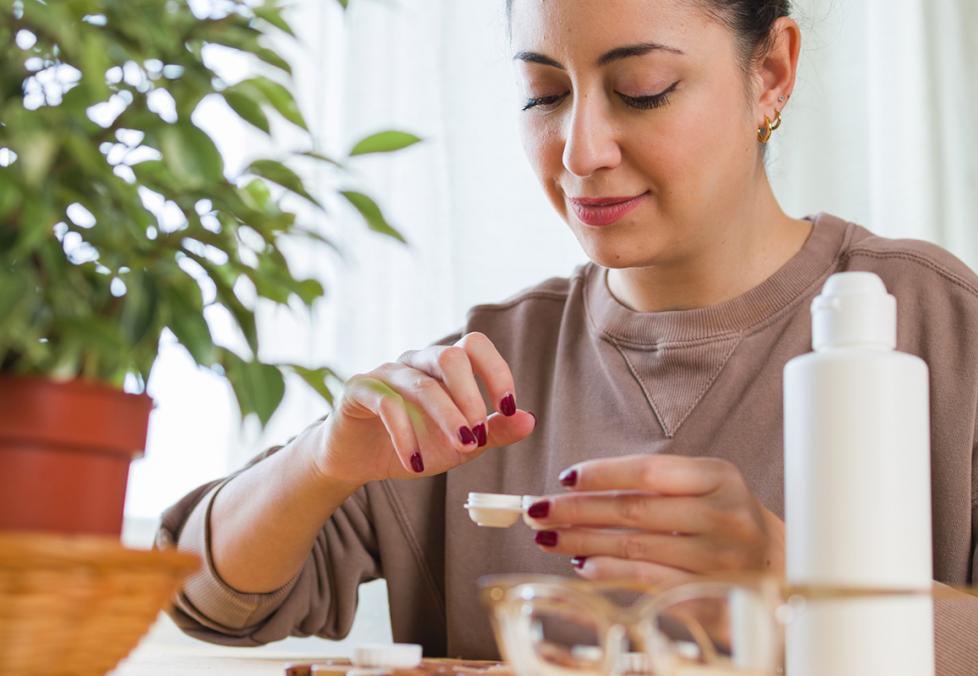
Two pairs and a free, quality eye exam for just $79.95
Everything you need to know to take care of your eyes — for life.
The most common types of contact lens solution have very key differences. Learn each one’s role in contact lens care, plus tips to know when to use them.

Do you wear contact lenses? Proper care and maintenance of your contacts is essential for your eye health. And one way to ensure that they stay comfortable and wet throughout the day is by using the right contact lens solution.
Not all contact lens solutions are created equal, says Sandra Pinon, O.D., an optometrist at America’s Best Eyecare + Eyewear in New Braunfels, Texas. She says it’s common for her patients to experience irritation or redness when using the wrong type for their eyes.
So, which type of solution is right for you? Learn the difference between two common types of contact solution, saline and multipurpose solution, their role in contact lens care, and which one to use and when.
Saline solution for contact lenses is a simple, sterile saltwater solution. Its primary ingredients are salt and water in a precise ratio that closely matches the natural salt level found in your tears, making it gentle on your eyes. The chief purpose of it is to rinse, not clean, contact lenses.
Saline alone doesn’t clean or disinfect your contact lenses, so it can’t remove harmful bacteria or protein deposits. Instead, it’s used as a final rinse after using a separate cleaning and disinfecting solution.
Pros: The primary advantage of saline solution is its gentle composition. It’s less likely to cause irritation compared to other solutions. This makes it a good option for people with sensitive eyes.
Cons: Saline solution doesn’t kill bacteria or remove protein and lipid (a type of fat) deposits that can accumulate on your lenses over time. For this reason, it’s not a good idea to use saline solution alone in the absence of a separate cleaning and disinfecting routine.
Did you know contact lens prescriptions need to be renewed every year? Now’s the time to book your contact lens eye exam!
Multipurpose solution is made up of a variety of ingredients, the most common of which are disinfectants and cleaning agents. This allows them to perform multiple functions, hence their name. For that reason, they’ve become a convenient and popular choice among many contact lens wearers.
Multipurpose solution is essentially an all-in-one solution designed to simplify the process of lens care. For example, it:
Pros: You might prefer a multipurpose contact lens solution for the convenience it offers. It eliminates the need for separate cleaning, rinsing, and disinfecting solutions. So, it can make contact lens care simpler, especially if you’re a beginner or in a rush. Multipurpose solution is also best for disinfecting, rinsing debris, and soaking soft contact lenses, according to the manufacturer’s guidelines, according to Dr. Pinon.
Cons: Some multipurpose solution users may experience sensitivity or allergic reactions to its ingredients—particularly the preservatives used—causing eye irritation or redness. Plus, while they are versatile, they may not remove protein deposits as effectively as enzyme cleaners, especially in the case of hard (rigid gas-permeable) lenses.
Identifying the differences between these two types of solutions can help you decide which one works best for your lens care needs.
Cleaning and Disinfecting Properties. Saline solution primarily serves as a rinsing agent and does not contain any cleaning or disinfecting agents. Multipurpose solutions, on the other hand, can be used to clean, disinfect, and store contact lenses, offering a comprehensive lens care routine in a single bottle. They kill harmful bacteria and fungi, and have cleaning agents that help break down and remove protein and lipid deposits.
Compatibility with Different Types of Contact Lenses. Saline solution and multipurpose solution can be used with most soft contact lenses, including disposable, extended-wear, and silicone hydrogel lenses. For hard lenses, a multipurpose solution might be the best option, due to its more robust cleaning and disinfecting properties. You can still use saline solution for rinsing these types of lenses, but not for cleaning or disinfecting them.
Considerations for Sensitive Eyes: If you have sensitive eyes, choosing between saline and multipurpose solution can be more complicated. Saline solution, due to its simplicity and absence of preservatives, might be the better option. It’s less likely to cause irritation, discomfort, or allergic reactions. Ask your eye doctor which cleanser they recommend pairing with the saline solution.

Two pairs and a free, quality eye exam for just $79.95
Choosing and using the right contact lens solution is crucial to maintaining eye health and comfort. Here are some tips to guide you.
Tip #1. Always get recommendations from your eye care provider. They can provide personalized advice based on your eye health, contact lens type, and lifestyle. They can also identify any signs of sensitivity or allergic reactions to certain solution ingredients.
Tip #2. Regardless of which contact lens solution you choose, proper storage and handling are essential. Always close the solution bottle tightly after use to prevent contamination. And it's never a good idea to transfer the solution to another container, as it can affect its sterility.
Tip #3. Pay attention to any signs of discomfort or irritation related to your contact lens solution. This could include redness, itchiness, or a burning sensation. If you notice any of these symptoms, consult your eye care provider. You may need to switch to a different solution or adjust your lens cleaning routine.
Picking and using the right contact lens solution for you is an important part of lens care. It can also significantly impact your eye health and comfort. The choice between saline solution and multipurpose contact lens solution depends on several factors, including your eyes’ sensitivity level, type of contact lenses, and lifestyle needs. Investing in the appropriate care for your contact lenses can ensure the longevity of your lenses and, most importantly, your eye health.
Medically reviewed by: John Bankowski, O.D.
See our sources:
Contact lens solution: Centers for Disease Control and Prevention
Contact lens care: American Academy of Ophthalmology